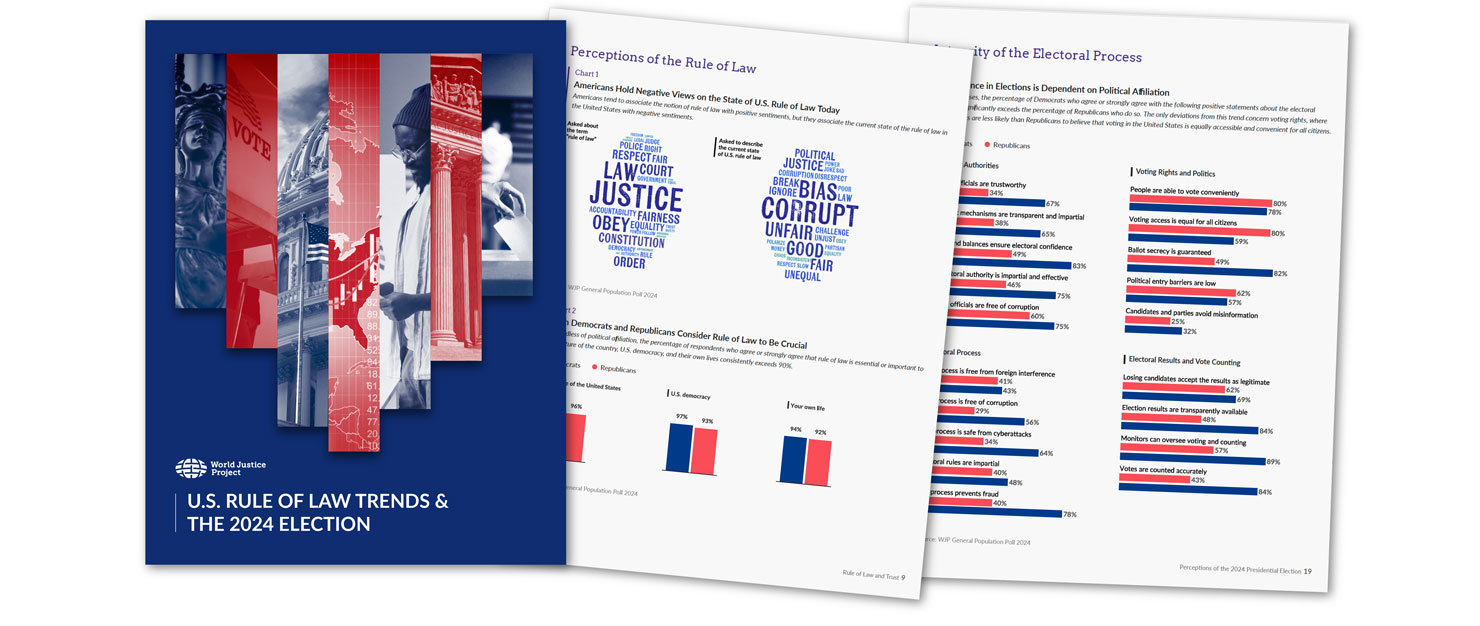

WASHINGTON (Sept. 17, 2024) – Over 96% of Democrats and Republicans agree: the rule of law is central to the country’s future, according to a new data report by the World Justice Project.
However, the report data shows that one-third of Americans would consider 2024 election results illegitimate if their favored presidential candidate loses; trust in courts and elections is highly polarized; and faith in government accountability is low.
In U.S. Rule of Law Trends and the 2024 Election, the World Justice Project (WJP) draws on a decade of rigorous national surveys that inform the global WJP Rule of Law Index, the world’s leading source for original, independent rule of law data. WJP’s latest nationally representative U.S. poll, administered to 1046 adults by YouGov in June, included new election-related questions.
Findings include:
-
Close to half of Republicans (46%) and more than a quarter of Democrats (27%) said they would not consider 2024 election results to be legitimate if the other party’s presidential candidate won.
-
Some of them would go further: 14% of Republicans and 11% of Democrats surveyed said they would take action to overturn the 2024 election based solely on who is declared the winner 1.
-
Only one-third of Republicans (34%) and two-thirds of Democrats (67%) believe election officials are trustworthy.
-
Overall, Democrats have far more faith in many aspects of the electoral process, particularly when it comes to fraud prevention and accurate vote counting.
-
However, less than half of Democrats (47%) would trust the Supreme Court to fairly determine the winner of a contested election, compared to two-thirds of Republicans (67%).
-
The proportion of Americans who believe a high-ranking official would be held accountable for breaking the law decreased from 60% to 35% in the last decade.
-
Many more Democrats than Republicans trust “the courts,” while many more Republicans trust “the Supreme Court.”
-
Large majorities of Americans continue to hold strong anti-authoritarian and rule of law values, but these majorities are slowly declining.
-
Around 13% of Americans (regardless of political affiliation) now say people do not need to obey the laws of a government they did not vote for.
In WJP’s latest national poll, the most common word Americans used to briefly describe “the rule of law” was “justice.” However, the most common word they use to describe the current state of U.S. rule of law was ‘“corrupt.”
“Today, trust in many U.S. institutions, government accountability, and overall rule of law is considerably lower than it was ahead of the 2020 election,” said Elizabeth Andersen, executive director of the World Justice Project.
Despite their concerns, 88% of Americans surveyed said they planned to vote this fall.
“The good news is, despite polarization, both Democrats and Republicans still agree on the fundamental principles of the rule of law, and they want to participate in democracy,” Andersen said.
But that alone won’t ensure a stable election process, she added.
“Distrust in the electoral process should be a wake-up call going into the November election,” Andersen said.
“It’s imperative that our public officials, media, community leaders, and informed citizens of all stripes work harder than ever to build trust in U.S. election integrity and commitment to the rule of law.”
Explore the full report and WJP's new "Rule of Law Scorecard" for political candidates at WorldJusticeProject.org/USruleoflaw
###
For interviews and information: [email protected]
About the World Justice Project
The World Justice Project (WJP) is an independent, nonpartisan, multidisciplinary organization working to create knowledge, build awareness, and stimulate action to advance the rule of law worldwide. WJP’s rigorous data and research include its flagship World Justice Project Rule of Law Index®, used by the World Bank, ratings agencies, businesses, civil society, and governments around the world to assess risk, shape policy, and track adherence to the rule of law in over 140 countries.
Effective rule of law reduces corruption, combats poverty and disease, and protects people from injustices large and small. It underpins development, accountable government, and respect for fundamental rights, and it is the foundation for communities of justice, health, opportunity, and peace. The World Justice Project defines the rule of law as a durable system of laws, institutions, norms, and community commitment that delivers: accountability, just laws, open government, and accessible justice. Learn more at worldjusticeproject.org.






